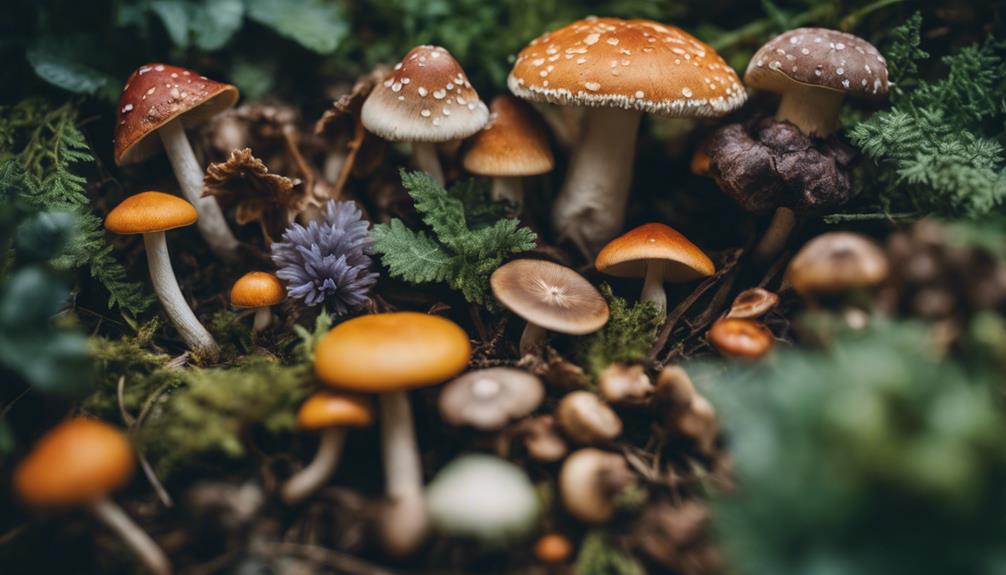By foraging effectively, you improve your chances of survival and reproduction by maximizing nutrient acquisition, increasing energy efficiency, and enhancing immune function, ultimately boosting your overall fitness and reproductive success. Effective foraging strategies also enhance your ability to adapt to changing environments, giving you a competitive edge. As you optimize your energy intake, you'll increase your fertility rates, attractiveness to potential mates, and chances of passing on advantageous traits to your offspring. Now, explore the fascinating ways foraging shapes the evolutionary success of organisms like you.
Key Takeaways
- Optimal foraging behaviors boost nutrient intake, enhancing energy reserves, immune function, and overall fitness.
- Efficient foraging strategies maximize energy acquisition, increasing chances of survival and reproduction.
- Improved foraging skills lead to better body condition, enhancing reproductive success and mating attractiveness.
- Effective foraging adapts to changing environmental conditions, providing a competitive advantage in resource acquisition.
- Diverse foraging for nutrient-rich foods enhances immune function, fighting off infections and diseases.
Enhanced Nutrient Acquisition
By optimizing their foraging behaviors, organisms can greatly boost their nutrient intake, thereby enhancing their overall fitness and reproductive success.
You see, efficient foraging behaviors are essential for organisms to obtain essential nutrients for growth and reproduction. By selecting the most beneficial food sources, foraging contributes to an organism's energy reserves and immune function. This, in turn, improves the organism's health and ability to reproduce successfully.
Key foraging strategies are vital to maximizing nutrient acquisition, which directly impacts an organism's survival and evolutionary success. When you think about it, foraging isn't just about finding food; it's about finding the right food that provides the necessary nutrients for optimal health and fitness.
Increased Energy Efficiency

You'll find that foraging improves an organism's fitness by maximizing energy efficiency during food search, which is essential for survival and reproduction. By adopting ideal foraging strategies, you'll gain more energy per unit of feeding time, enhancing your overall fitness. This is because energy efficiency in foraging directly impacts your ability to survive and pass on advantageous traits.
As you forage, your behaviors are shaped by natural selection to optimize energy intake, leading to improved fitness and evolutionary success. By maximizing energy acquisition, you'll increase your chances of survival and reproduction. This is because energy efficiency is vital for survival, and organisms that can't acquire energy efficiently are less likely to thrive.
In essence, foraging behaviors that maximize energy efficiency are favored by natural selection, as they enhance an organism's fitness and ability to pass on advantageous traits. By adopting these strategies, you'll be more likely to survive and reproduce, ultimately leading to evolutionary success.
Improved Reproductive Success

As you optimize your foraging strategies to maximize energy efficiency, you'll also experience a significant boost in reproductive success, thanks to the increased energy intake and survival rates that come with it. This is because improved foraging skills lead to better body condition, higher fertility rates, and increased chances of successful reproduction.
By securing more energy, you'll be more attractive to potential mates, better equipped to compete for resources, and more capable of providing for your offspring.
Here are four key benefits of improved foraging on reproductive success:
- Increased fertility rates: With a steady supply of energy, you'll be more fertile and capable of producing healthy offspring.
- Better body condition: A well-nourished body is more resilient to stress and better equipped to handle the demands of reproduction.
- Enhanced mating success: Your improved foraging skills will make you a more attractive mate, giving you a competitive edge in the mating game.
- Passing on advantageous traits: As natural selection favors individuals with superior foraging abilities, you'll be more likely to pass on these beneficial traits to the next generation, contributing to higher fitness and reproductive success.
Enhanced Environmental Adaptation

When foraging effectively, you adapt more efficiently to changing environmental conditions, optimizing energy intake and minimizing energy expenditure to thrive in your habitat. This enhanced environmental adaptation gives you a competitive advantage, allowing you to outcompete others for resources and increase your chances of survival.
By developing efficient foraging strategies, you can better navigate complex ecological relationships, avoiding predators and securing essential resources.
Optimal foraging behaviors enable you to respond to environmental cues, maximizing energy intake while minimizing energy expenditure. This, in turn, boosts your evolutionary fitness, increasing your chances of passing on advantageous traits to future generations.
As a result, your ability to adapt to changing environmental conditions improves, ensuring you're better equipped to face challenges in your habitat.
Boosting Immune Function

By foraging for a diverse range of foods, you can enhance your immune function, providing your body with essential nutrients and antioxidants that help fight off infections and diseases. This ideal behavior allows you to selectively target foods rich in immune-boosting compounds, which can contribute to improved immune responses and overall health.
Here are some ways foraging can boost your immune function:
- Nutrient-rich foods: Foraging for a diverse range of foods provides essential nutrients that help fight off infections and diseases.
- Antioxidant-rich foods: Consuming foods rich in antioxidants during foraging helps protect your body from oxidative stress, which can weaken your immune system.
- Probiotics and antimicrobial properties: Foraging for specific foods containing probiotics or antimicrobial properties helps maintain a healthy gut microbiome, essential for a strong immune system.
- Enhanced immune response: By consuming these immune-boosting compounds, you can increase your ability to resist infections and diseases in your environment.
Frequently Asked Questions
How Does Foraging Improve an Organism's Overall Fitness?
You wonder how foraging improves an organism's overall fitness? Well, by maximizing energy gain and minimizing expenditure, you increase your chances of survival, reproduction, and passing on advantageous traits, ultimately contributing to your evolutionary success.
What Is Optimal Foraging Theory and How Does It Impact an Organism's Behavior?
'Variety is the spice of life,' and in foraging, it's about maximizing energy gain while minimizing costs. Efficient foraging theory predicts strategies to optimize resource gathering, shaping your behavior through natural selection, ensuring efficient foraging and adapting to changing conditions.
What Is Foraging and Why Is It Important?
You're about to uncover the significance of foraging, which is the process of searching, obtaining, and consuming food to meet your energy needs, and it's essential because it directly impacts your survival and reproductive success. For both humans and animals, foraging is a fundamental skill that determines access to vital nutrients and the ability to sustain life in various environments. Understanding how foraging works for beginners involves learning to identify edible resources, knowing where to find them, and optimizing energy expenditure during the search. In modern contexts, this practice also includes reconnecting with nature and recognizing the benefits of wild food. For beginners, understanding *how does foraging work* requires patience and practice, as it involves learning about local ecosystems and distinguishing between safe and harmful plants or animals. It’s not just about survival—it fosters a deeper connection with the natural world, encouraging sustainable practices and environmental stewardship. By exploring *how does foraging work*, individuals also gain a unique appreciation for the abundance nature provides and develop skills to responsibly gather food without depleting resources.
Why Is Foraging Good for Animals?
As you venture into the wild, you'll find that foraging is like having a "superpower" – it boosts your energy, saves time, and increases reproductive success, making you a rockstar in the animal kingdom!
Conclusion
You've now discovered the secrets of foraging's benefits!
Did you know that foraging animals can increase their food intake by up to 30% compared to non-foraging counterparts?
This boost in nutrient acquisition, energy efficiency, reproductive success, environmental adaptation, and immune function all contribute to a significant improvement in an organism's overall fitness.
By embracing foraging behaviors, organisms can thrive in their environments, outcompeting their non-foraging peers and ensuring their survival in an ever-changing world.










